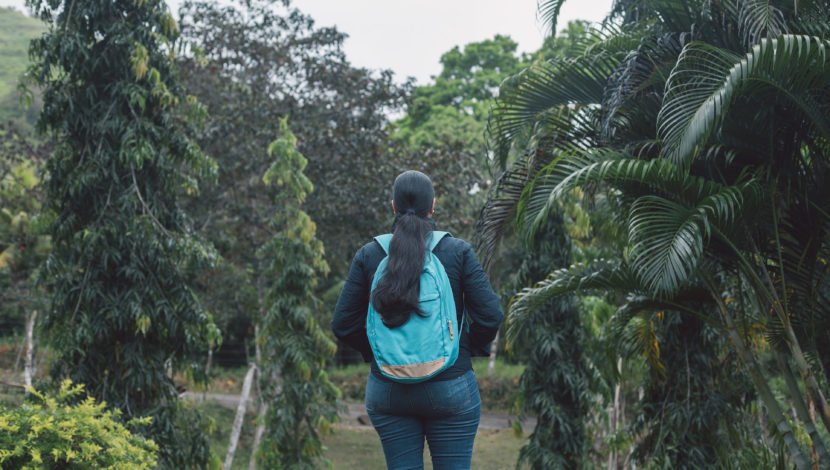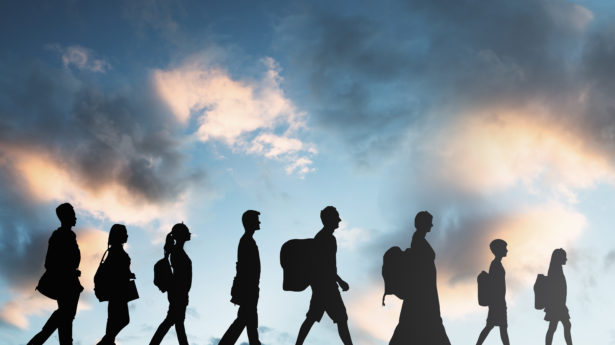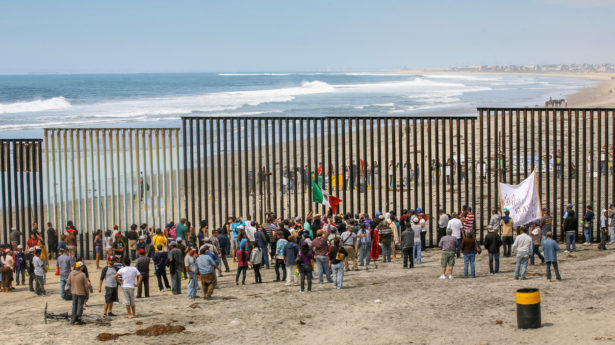The Unitarian Universalist Service Committee advances human rights through grassroots collaborations.
“Migration is an Act of Love”

June 23, 2022
UUSC partner Asociación Pop Noj in Guatemala authored a statement on the importance of migration. Below is an edited version of the statement.
Migration is a human right; but it should be an option and not an obligation. Asociación Pop No’j is committed to ensuring that the decision to migrate is an option, not the only way out to survive. Migration must take place with consideration; forced migration can negatively impact different groups, including Indigenous women and children.
At Pop No’j, we root our approach in the wisdom of Indigenous Peoples, reaffirming their identities and valuing their cultures as a strength for the construction of Good Living (“Buen vivir” in Spanish or “Utz Kaslemal” in Maya K’iche). It is a holistic concept promoting respect and dialogue; it recognizes that everyone should have what is necessary to live sustainably. It proposes a modest and simple life—happy and plentiful, individual and collective, material and spiritual—in harmony with Mother Earth and all the energies of the universe.
For Indigenous people, migration is not a problem; it has always been an opportunity for an exchange between peoples, for trade, for growth, for mutual support. Migration has always opened the possibility of communication between communities and peoples.
For Indigenous people, the term “migration” does not exist; instead, these communities refer to the walker, the traveler.
Mobility is part of the history of humanity; it is how humanity has developed. Migration is part of the peopling of the world. This is also true for Maya people. In the Popol Vuj—the Maya’s sacred book—it is recognized as the origin of the Maya people.
People have moved from one place to another as individuals, families, and communities; generally, people did not travel alone, but in groups. The trip had different purposes, framed in the way of life of the communities; among them, the main necessity was the need for exchange as part of their economies. People who went from the highlands to the lowlands of Guatemala carried loads of products to sell or exchange. Mayas had commerce with other Indigenous peoples across the American continent.
Our grandfathers and grandmothers tell us that there were wells of water on walking routes to provide serve travelers as they passed. Others planted fruit trees by the roads so that people passing by could eat their fruits. Nowadays, when the sacred corn is harvested, something is always saved so that it may be shared with the people who arrive in our communities; these travelers bring something to sell or exchange with the community.
Our grandparents also explain the construction of houses on the edge of roads. There was a small corridor in front of the house, without walls, but covered with tiles or straw to provide a resting place so that the walkers could spend the night as they passed through. The old women sold cracked maize atole, a warm beverage, on the side of the road; walkers drank the atole to regain strength to continue their journey. Historically, all these practices have contributed to meeting, exchanging, and enriching the wisdom of the peoples.
The borders between different countries have not been built by Indigenous peoples. For Indigenous peoples, Mother Earth belongs to everyone and is for everyone. Borders have been established as a product of those who have power. This explains why some Indigenous peoples of the same ethnic group are in two or more different countries, as is the case of the Maya Mam, Maya Q’eqchi and Maya Ch’orti that are in Guatemala and neighboring countries.
In many cases, the friendly treatment of travelers has been lost due to poverty and the influence of capitalism, in which private property and individualism are exalted. There is no common interest but the search for profit and accumulation, which is much different from the Indigenous concept of Good Living.
Today the Guatemalan population is estimated at 17.5 million people and outside the borders, there are more than one million Guatemalans.
Migration is a multi-causal phenomenon in which different causes and motivations are interwoven. Currently, there are other factors that cause migration such as extreme poverty and the lack of economic opportunities. These issues are also aggravated by climate change. In addition, it has to do with the different forms of violence that threaten the way of life of communities. The existence of armed groups belonging to organized crime structures has affected the dynamics of the peoples and is a source of violence.
We recognize the contribution and courage of migrants, who despite the risks, decide to migrate. They are enterprising and fighters, strategic agents of change, who contribute to local development. Those who decide to migrate irregularly are courageous people who take risks in search of better living conditions for themselves and their families. In this sense, migration in many cases is also an act of love.
At Pop No’j, we recognize the dignity of migrants, as a counteraction to the criminalization and victimization they often experience.
We point out that the detention and deportation policies of different nations in relation to irregular migration do not stop migration, they only make it riskier and more costly.
Comprehensive attention should be paid to migration and its related problems, which impact Indigenous peoples, women, and children differently, making them more vulnerable.
Photo Credit: iStock—Dionisio Cedeno

